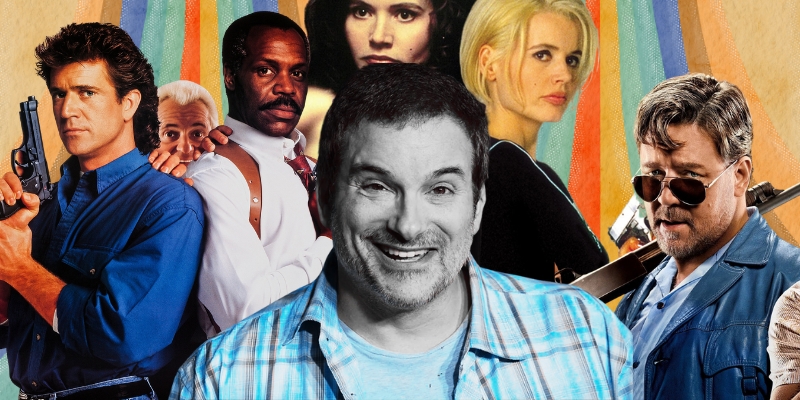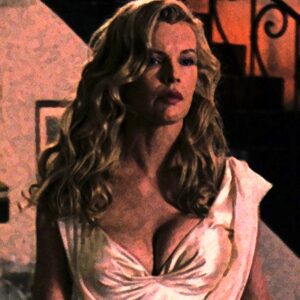When Shane Black writes a movie, he loves to include certain elements: a pair of mismatched buddies who grow close while dodging bullets, near-constant quips, a labyrinthine crime plot climaxing in a massive shootout, and (often) a holiday setting. Lethal Weapon (1987), his first produced screenplay, established that template; The Nice Guys (2016), one of his most recent, keeps riffing on it.
The success of Black’s movies spawned the inevitable imitators. Although Lethal Weapon didn’t invent the buddy-cop genre (that honor might go to Walter Hill’s 48 Hours, which debuted a few years before), its success led to a swath of movies that mimicked Black’s humor and paranoia, often with diminishing results.
Meanwhile, Black continued to sell scripts for big bucks that were made into big movies: The Last Boy Scout (1991), a Bruce Willis action flick that took place against the backdrop of NFL corruption, and The Long Kiss Goodnight (1996), an amnesia thriller with Geena Davis and Samuel L. Jackson.
(Black’s screenplays also include another infamous element, known as “Shane Blackisms,” in which self-referential quips are sprinkled throughout the text. :Remember Jimmy’s friend, Henry, who we met briefly near the opening of the film? Of course you do, you’re a highly-paid reader or development person,” is an infamous one from The Last Boy Scout. Screenwriting teachers will order you to never, ever attempt this in your own screenplays.)
Uncomfortable with the attention from his massive paydays—if you want to make every screenwriter in L.A. jealous, let them know you’ve earned $4 million for a single script—Black walked away from the industry for a few years. When he returned, he leaned hard into pulp by writing and directing Kiss, Kiss, Bang, Bang (2005), a hardboiled yarn in which Val Kilmer and Robert Downey Jr. play a detective and conman, respectively, who team up to solve a murder case.
A decade after that, he made the aforementioned The Nice Guys, with Russell Crowe and Ryan Gosling as a professional arm-breaker and detective thrown into an L.A. case involving pornography, vehicle emissions, and a bunch of scary assassins (it all makes sense onscreen).
During this latter period, Black also wrote and directed two big-budget studio films: Iron Man 3 (2013) and The Predator (2018). The former, which was a huge box-office hit, grafts the Shane Black tropes onto the Marvel movie formula—Robert Downey Jr. and Don Cheadle doing a buddy superhero thing amidst all the explosions and CGI.
The Predator movie, which contained precious few Shane Black elements, crashed and burned at the box office; perhaps Black took the helmer job out of nostalgia, considering one of his few acting jobs was a supporting role (re: killed pretty early) in the original “Predator” film with Arnold Schwarzenegger.
In an odd fashion, Black’s career echoes that of a handful of old-school Hollywood directors like Raoul Walsh, who jumped freely between studio jobs and rougher noirs. It would be a stretch to call Black “the last noir director,” considering the number of directors still producing great detective and noir films, at least on an indie level, but it sounds cool and homage-y, so we’ll use it as the title of this article unless the editor demands we cut it out.
Unlike many of those directors of yesteryear, Black has endured in an industry famous for chewing up and spitting out even the biggest talents. Why has he endured? What makes his work different from decades of imitators? It might have far less to do with the quips and explosions and more with the melancholy that lives at the heart of his best screenplays—adding a layer of emotional depth that’s relatable and memorable.
Whereas many an action or crime movie makes an unstoppable badass its central protagonist (your John Wicks, your James Bonds), Black went against the grain by crafting antiheroes who are damaged in severe ways, if not outright losers.
If you haven’t watched the Lethal Weapon movies in a decade or two, you might remember Mel Gibson’s Martin Riggs as a darkly funny cop with a mean roundhouse kick. In the original movie that Black wrote, though, Riggs suffers from intense PTSD and depression thanks to the death of his wife and his years fighting in Southeast Asia.
As he tells Roger Murtaugh (Danny Glover), his reluctant partner: “When I was nineteen, I did a guy in Laos from a thousand yards out. It was a rifle shot in high wind. Maybe eight or even ten guys in the world could have made that shot. It’s the only thing I was ever good at.”
<iframe width=”560″ height=”315″ src=”https://www.youtube.com/embed/fffK3OwHd98?si=N6A1z9i4dWig2Wjp” title=”YouTube video player” frameborder=”0″ allow=”accelerometer; autoplay; clipboard-write; encrypted-media; gyroscope; picture-in-picture; web-share” referrerpolicy=”strict-origin-when-cross-origin” allowfullscreen></iframe>
Black’s noirish films lean into this idea of broken people even harder. In “Kiss, Kiss, Bang, Bang,” Robert Downey Jr.’s Harry Lockhart isn’t just a mostly unsuccessful conman; he’s also a coward who’s prone to freakouts. And if that wasn’t enough to lower his potential for survival amidst L.A.’s murderers and criminals, he’s not the sharpest knife in the proverbial drawer:
<iframe width=”560″ height=”315″ src=”https://www.youtube.com/embed/NiAbqHXwclo?si=J63HmIueERlmaOPG” title=”YouTube video player” frameborder=”0″ allow=”accelerometer; autoplay; clipboard-write; encrypted-media; gyroscope; picture-in-picture; web-share” referrerpolicy=”strict-origin-when-cross-origin” allowfullscreen></iframe>
And trope reaches its apex (or its nadir, depending on your perspective) with The Nice Guys, in which Ryan Gosling’s Holland March isn’t limited to being an alcoholic whose teenage daughter is far more mature than him; he’s probably the worst detective in L.A. history, which is saying something. A halfway-decent sleuth would know how to execute a simple break-in, for starters:
<iframe width=”560″ height=”315″ src=”https://www.youtube.com/embed/KGp9PHF5tus?si=TFdaMTbeBJafweKQ” title=”YouTube video player” frameborder=”0″ allow=”accelerometer; autoplay; clipboard-write; encrypted-media; gyroscope; picture-in-picture; web-share” referrerpolicy=”strict-origin-when-cross-origin” allowfullscreen></iframe>
Most Hollywood executives want scripts with aspirational protagonists, larger-than-life figures we can respect for their skills, if not envy outright. Those characters might have their flaws, sure, but the conventional wisdom is that no studio or streaming service will drop millions of dollars on a film starring someone who can’t get it together, or whose mind is cracked in seemingly uncurable ways.
Black made himself an exception to that rule, because he seems to realize one crucial thing: the deeper the flaws, the more potentially relatable the character.Meanwhile, Black made himself an exception to that rule, because he seems to realize one crucial thing: the deeper the flaws, the more potentially relatable the character. Many of us suffer from lack of self-worth; we think we’re at least a little crazy; we have oddball habits and we sometimes struggle to figure out what’s even going on.
If you think you’re only good at a few terrible things, you might gravitate toward Martin Riggs or Samantha Caine, Geena Davis’s damaged assassin in The Long Kiss Goodnight; if you’ve ever failed to piece together a few simple facts before everyone around you, you’re probably smiling at how the amateur detectives in Kiss, Kiss, Bang, Bang and The Nice Guys bumble through their respective plots.
But unlike many of Black’s antiheroes, we’re probably not due for a holiday-themed redemption.

















